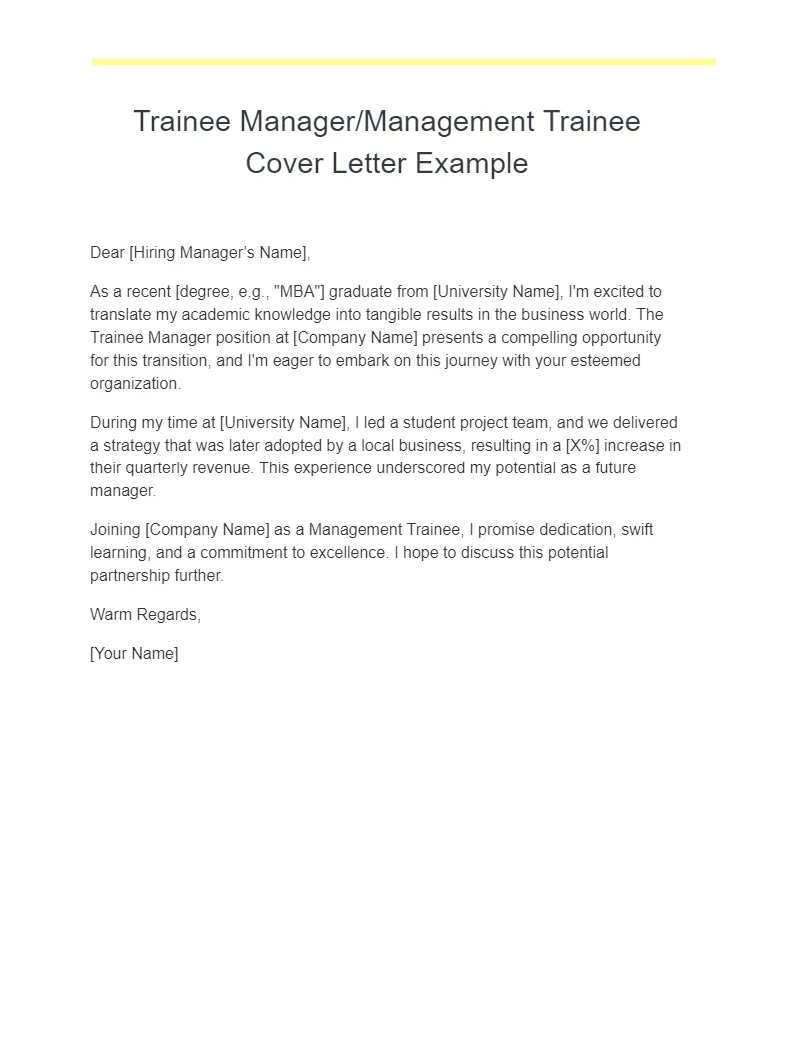Why a Management Cover Letter Is Essential
A management cover letter is more than just a formality; it’s your initial opportunity to make a strong impression on a potential employer. In a competitive job market, a well-crafted cover letter serves as a crucial tool to highlight your qualifications and express your enthusiasm for the management position. Unlike a resume, which provides a factual overview of your experience, a cover letter allows you to showcase your personality, communication skills, and passion for the role. It gives you the chance to connect your skills and experience directly with the specific requirements of the job, demonstrating why you are the ideal candidate. A compelling cover letter can significantly increase your chances of securing an interview, making it a vital component of your job application strategy. Consider it your personal sales pitch, designed to convince the hiring manager that you’re the perfect fit.
Highlighting Your Management Skills
Effective management requires a diverse skill set. Your cover letter should specifically highlight the skills most relevant to the management position you are applying for. This involves not just listing your skills but also providing concrete examples of how you’ve used them to achieve positive outcomes. The key is to demonstrate how your skills align with the company’s needs and the job responsibilities outlined in the job description. By focusing on the skills that matter most to the employer, you can create a targeted cover letter that resonates with the hiring manager and sets you apart from other candidates. Always quantify your achievements whenever possible to add credibility to your claims.
Leadership Abilities
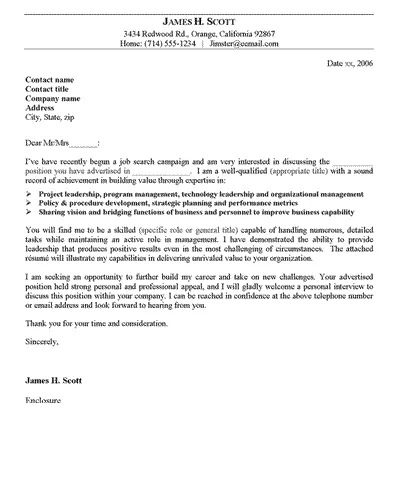
Leadership is a cornerstone of effective management. In your cover letter, showcase your ability to inspire, motivate, and guide teams toward achieving common goals. Provide specific examples of times you’ve led a team to success, such as leading a project, implementing a new strategy, or resolving a conflict. Mention any leadership training or certifications you possess. Highlight your capacity to make difficult decisions, take initiative, and foster a positive and productive work environment. Leadership isn’t just about giving orders; it’s about empowering others, providing support, and creating a vision that everyone can follow. Showcasing your leadership abilities demonstrates your capacity to drive results and build a strong team.
Communication Skills
Excellent communication skills are critical for managers. Detail your ability to clearly and effectively communicate with various stakeholders, including team members, clients, and senior management. Provide examples of how you’ve used written, verbal, and non-verbal communication to achieve specific objectives. This might include presenting to a board, writing compelling reports, or mediating conflicts. Illustrate your ability to listen actively, provide constructive feedback, and adapt your communication style to suit different audiences. Effective communication fosters transparency, builds trust, and ensures everyone is on the same page. Managers who communicate effectively build strong relationships and drive team performance.
Problem-Solving Skills
Managers are often called upon to solve complex problems. In your cover letter, emphasize your problem-solving abilities and provide examples of situations where you successfully identified, analyzed, and resolved issues. Detail the steps you took to address the problem, the tools or strategies you employed, and the positive outcomes achieved. Demonstrate your ability to think critically, make informed decisions, and find creative solutions. Highlight any experience you have in areas such as risk management, process improvement, or conflict resolution. Showing your problem-solving abilities tells the hiring manager that you can handle challenges and drive positive change.
Structuring Your Management Cover Letter
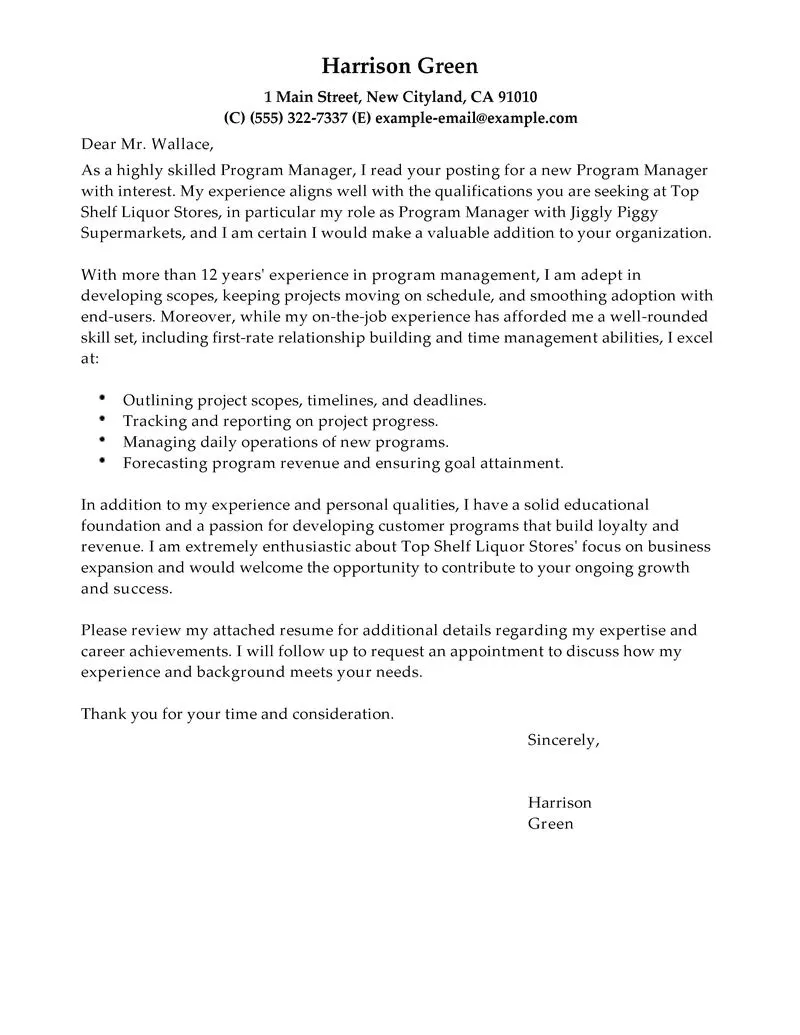
A well-structured cover letter is easy to read and conveys professionalism. Begin by creating a clear and logical structure, with each section serving a specific purpose. This structure will not only help you organize your thoughts but will also ensure that the hiring manager can quickly grasp your key qualifications. The standard format of a cover letter includes a header with your contact information, a formal salutation, an opening paragraph, body paragraphs detailing your skills and experience, a closing paragraph expressing your interest, and a professional closing. Maintaining a clean and easy-to-follow structure is critical to making a positive impression.
Header and Contact Information
Your header should include your full name, address, phone number, and professional email address. Make sure your contact information is up-to-date and easily accessible. This is crucial because if the hiring manager is impressed by your letter, they’ll need to quickly and easily contact you. Consider using a professional-looking font and format to maintain a clean and polished appearance. Avoid using nicknames or unprofessional email addresses. Accuracy in this section is key – ensure all the information is correct, as this is the first point of contact the employer will have with you. This section sets the stage for the rest of your letter.
The Opening Paragraph
The opening paragraph should immediately grab the reader’s attention. Start by stating the position you are applying for and how you learned about it. Then, briefly explain why you are a good fit for the role. This is your opportunity to showcase your enthusiasm and make a strong first impression. Tailor your opening to the specific company and role, demonstrating that you have researched the organization and understand their needs. A compelling opening sets the tone for the entire cover letter, drawing the reader in and making them want to learn more about your qualifications. Avoid generic opening statements; instead, focus on expressing your genuine interest and relevant skills.
Body Paragraphs
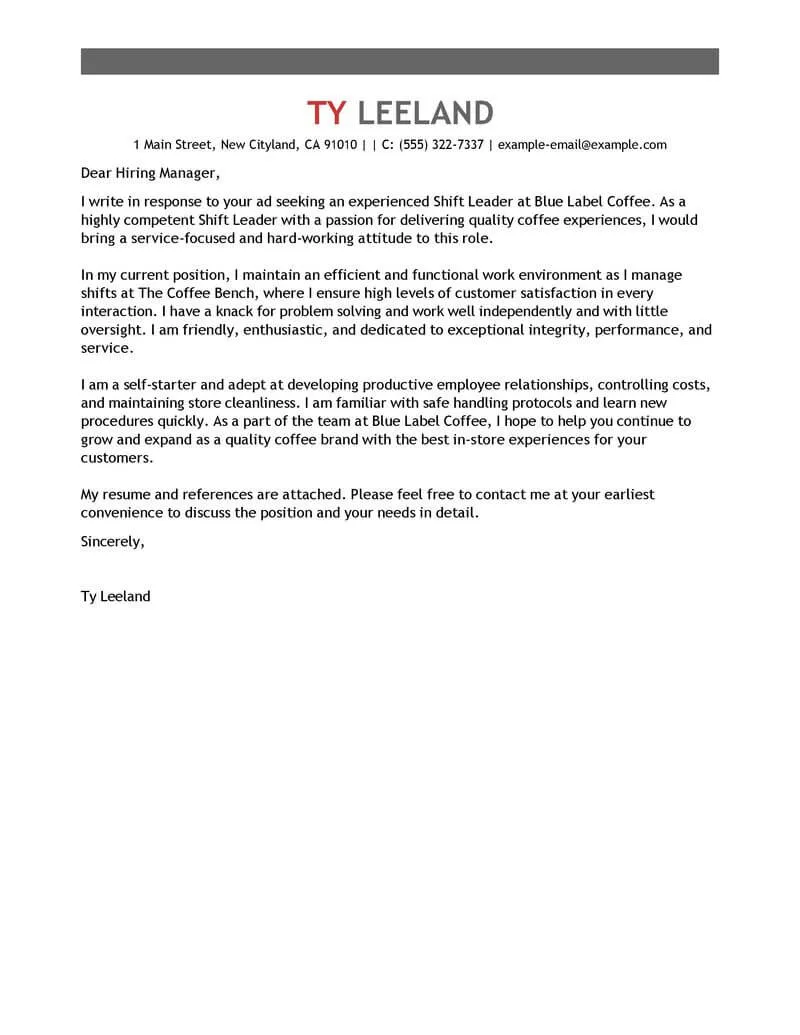
The body paragraphs are the heart of your cover letter. Here, you’ll detail your relevant skills, experience, and accomplishments. Use specific examples to illustrate your qualifications and demonstrate how you’ve achieved positive results in past roles. Each paragraph should focus on a different aspect of your experience, linking your skills to the requirements outlined in the job description. Quantify your achievements whenever possible by using numbers and data to support your claims. This section should showcase why you are the best fit for the management position and convince the hiring manager to call you for an interview. Remember to tailor these paragraphs to the job requirements.
The Closing
The closing paragraph should reiterate your interest in the position and thank the reader for their time and consideration. Express your enthusiasm for the opportunity and restate your key qualifications. Include a call to action, such as inviting the hiring manager to contact you for an interview. Keep the tone professional and positive, leaving the reader with a favorable impression. End your cover letter with a formal closing, such as “Sincerely” or “Best regards,” followed by your name. This final paragraph should reinforce your eagerness for the position and reinforce your belief in being the right candidate.
Essential Elements of a Management Cover Letter
Several key elements can significantly enhance your management cover letter and increase your chances of success. Focus on including details that directly align with the job description and the company’s needs. By addressing these elements, you show that you understand the position and are prepared to take on its challenges. Remember, your goal is to demonstrate your value and convince the employer that you are the best choice for the role. Always double-check that your cover letter effectively showcases your qualifications and expresses your genuine interest in the position.
Quantifiable Achievements
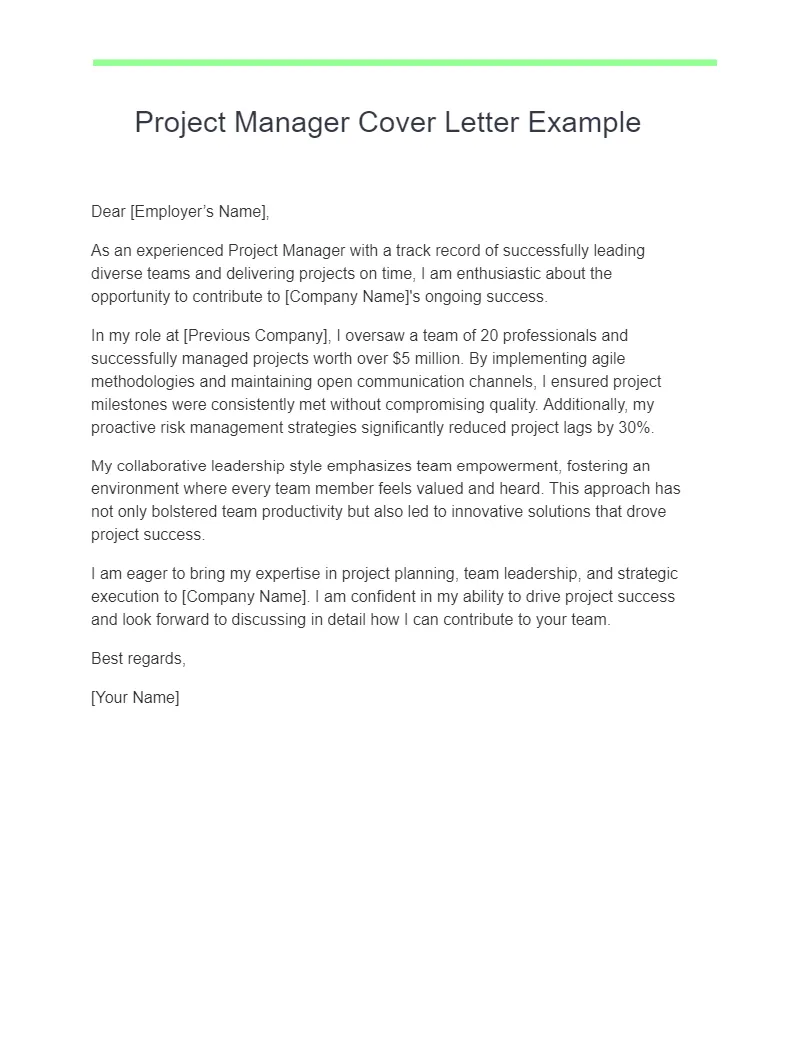
Quantifiable achievements are crucial for demonstrating your impact. Instead of simply stating your responsibilities, provide concrete examples of your accomplishments using numbers, data, and statistics. For instance, instead of saying you “improved team performance,” you could say “increased team productivity by 20% in one quarter through the implementation of a new training program.” Using quantifiable achievements provides concrete proof of your capabilities and makes your claims more credible. Consider how you have improved efficiency, reduced costs, increased revenue, or improved customer satisfaction in your previous roles. This data provides irrefutable evidence of your skills and success.
Tailoring to the Job Description
Each cover letter should be tailored to the specific job description. Carefully review the job requirements and responsibilities, and align your skills and experience accordingly. Customize your cover letter to address the specific needs of the role and highlight the qualifications most relevant to the position. Mention the company’s name and its values to show that you understand their culture and are interested in their business. This level of personalization demonstrates your attention to detail and your genuine interest in the role. Avoid using a generic cover letter; instead, create a unique letter that directly addresses the specific requirements of each job you apply for.
Keywords and Action Verbs
Use relevant keywords and action verbs throughout your cover letter. Review the job description and incorporate keywords that are commonly used to describe the required skills and qualifications. Using these keywords helps your application pass through applicant tracking systems (ATS) and ensures that your qualifications are easily identified by the hiring manager. In addition to keywords, use strong action verbs to describe your accomplishments and responsibilities. Examples include “led,” “managed,” “implemented,” “achieved,” and “improved.” This creates a dynamic and engaging cover letter that captures the reader’s attention and highlights your accomplishments.
Common Mistakes to Avoid
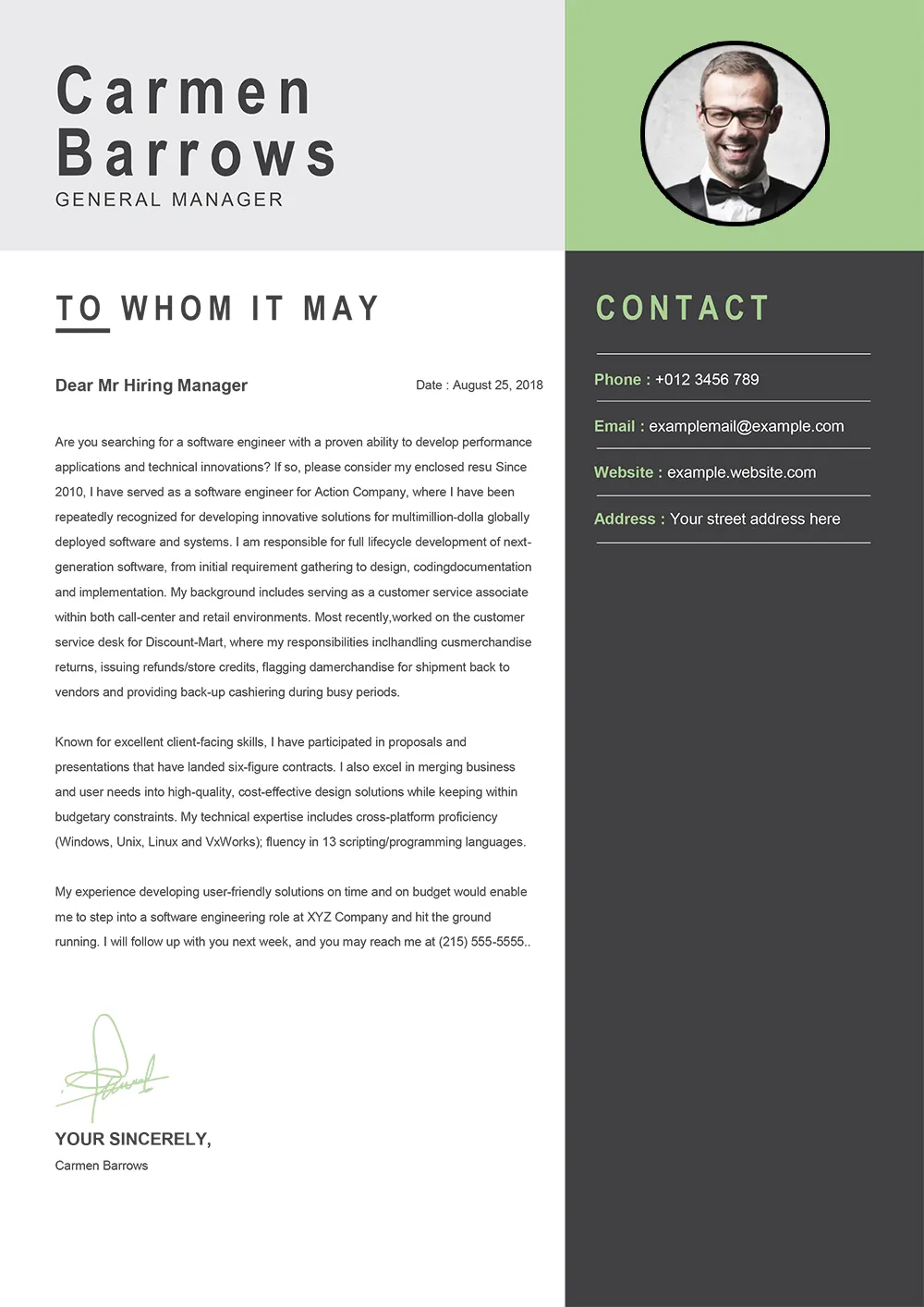
Avoiding common mistakes can dramatically improve the effectiveness of your cover letter. Be mindful of errors that can undermine your application, such as generic language, typos, or a lack of specificity. By paying attention to these details, you can increase your chances of making a positive impression on the hiring manager and standing out from other applicants. Ensuring your cover letter is well-written and tailored to the specific job demonstrates your professionalism and attention to detail.
Generic Cover Letters
Using a generic cover letter is a major mistake. A generic letter lacks personality and fails to demonstrate your specific interest in the job and company. These letters often appear as though they have been sent to multiple employers. A generic cover letter does not address the specific requirements of the job or the company’s values. Always customize your cover letter to reflect the job description and the company’s unique qualities. Tailoring your letter shows that you have researched the company and are truly interested in the role, increasing your chances of getting an interview. Avoid the temptation to use a one-size-fits-all approach.
Typos and Grammatical Errors
Typos and grammatical errors can ruin your chances. Proofread your cover letter carefully before submitting it. Errors suggest a lack of attention to detail and can make you appear unprofessional. Before submitting, check for any spelling mistakes, grammatical errors, and punctuation problems. Use spell-check and grammar-check tools, but don’t rely on them entirely. Have someone else review your letter for mistakes. A well-written, error-free cover letter demonstrates your professionalism and commitment to quality, thus increasing your chance of getting the job.
Lack of Specificity
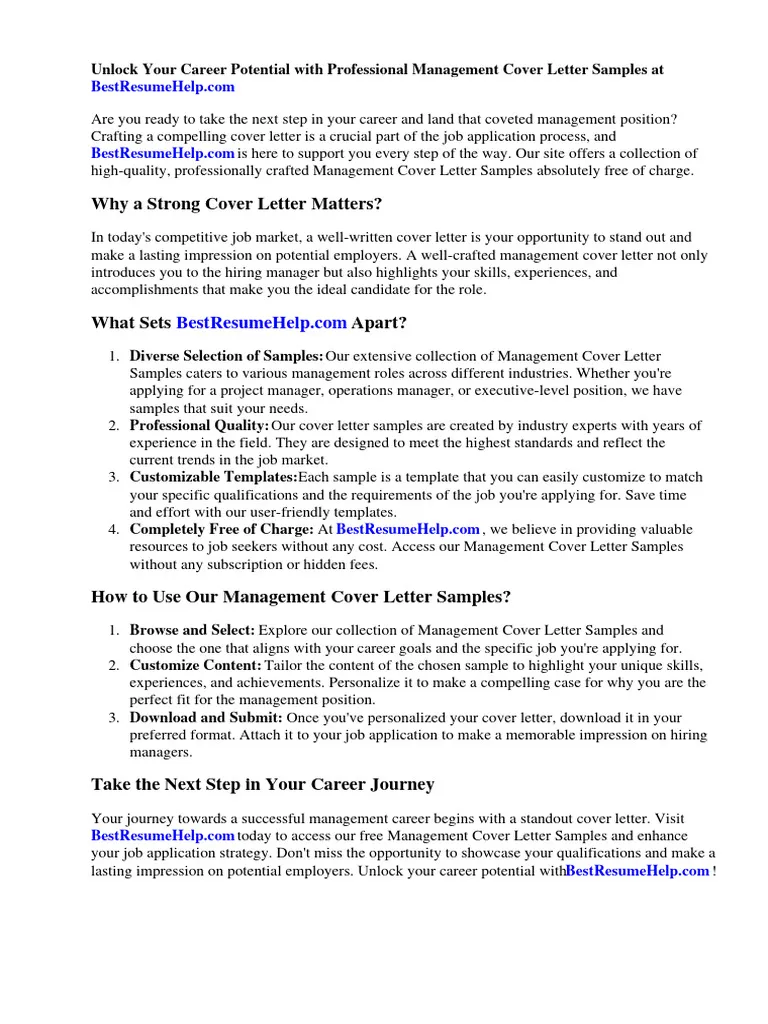
A cover letter lacking specificity fails to showcase your skills and accomplishments. Instead of making general statements, provide concrete examples of your achievements. Show, don’t tell, the hiring manager what you are capable of. Use quantifiable achievements, such as numbers and data, to support your claims. Tailor your cover letter to the job description and highlight the skills and experience most relevant to the position. Specificity demonstrates your ability to produce results and allows the employer to see exactly how you can contribute to their team. A detailed cover letter can make your application more impactful.
Management Cover Letter Template Example
Here’s a basic example of a management cover letter template to help you get started. Remember to customize this to fit your specific skills and the job description.
[Your Name] [Your Address] [Your Phone Number] [Your Email]
[Date]
[Hiring Manager Name] (if known) [Hiring Manager Title] [Company Name] [Company Address]
Dear [Mr./Ms./Mx. Last Name],
I am writing to express my interest in the [Job Title] position at [Company Name], as advertised on [Platform]. With [Number] years of experience in management, I am confident I possess the skills and experience necessary to excel in this role.
In my previous role at [Previous Company], I was responsible for [Key Responsibility 1] and [Key Responsibility 2]. For example, I successfully [Quantifiable Achievement 1] and [Quantifiable Achievement 2]. I am adept at [Key Skill 1], [Key Skill 2], and [Key Skill 3], which I believe are critical for this position.
I am particularly drawn to [Company Name] because of [Reason]. I am excited about the opportunity to [Specific Contribution].
Thank you for your time and consideration. I have attached my resume for your review and welcome the opportunity to discuss my qualifications further in an interview.
Sincerely, [Your Signature] [Your Typed Name]
Tips for a Standout Cover Letter
To create a standout cover letter, consider these additional tips. Focus on making your letter memorable, highlighting your unique skills, and demonstrating your enthusiasm for the role. Creating a memorable cover letter can make your application stand out from the crowd, making the hiring manager more likely to remember and consider your application. By following these tips, you can significantly increase your chances of securing an interview and ultimately landing your dream job.
Highlight your unique selling points and the specific skills and experience that make you a great fit for the role. Include a compelling narrative that showcases your achievements and demonstrates your ability to drive results. Make sure to address any potential concerns or gaps in your experience. Finally, proofread carefully for errors.
